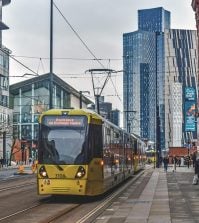‘Bureaucracy – oh a living hell’: five minutes with Estonia’s CTO Kristo Vaher

The chief technology officer tells GGF about having finally ‘cracked it’ after years as an automation engineer, why he believes the civil service should neither design nor build citizen services, and his goal to make his role redundant
What drew you to a career in the civil service?
I felt a desire to do something more for the people closest to me. In the private sector, the majority of my projects were business-to-business or business-to-consumer and did not affect the daily lives of my friends and family. I felt that in Estonia we are small enough that one person’s passion is enough to make an impact – thus I took up the challenge. Not lightly, mind you, but I’m inspired by that choice to this day.
What have you achieved in your career that you’re most proud of?
About two years ago I felt like I’d ‘cracked it’. As an engineer my life has been dedicated to abstracting real life into automated systems and building quality small systems that are connected to the larger, interoperable whole. But I have always been interested in figuring out how the big picture comes together: how can technology help me and everybody live ‘more’ by automating all the boring routine stuff and what is the best way to do it? So, after years of working on it, two years ago that vision ended up as a concept paper which is now the basis of building the next generation of digital government information systems. Having cracked it, I am still working on it and enhancing it, and it will be turned into a book hopefully in a couple of years with examples and use cases from the projects we are running right now in Estonia.
What more do you want to achieve before you retire?
My goal is to retire because my role is no longer required. I strongly believe that in leadership and management one of your main goals is to make sure your team and the people dependent on you are able to function towards the larger vision without management. I believe that a healthy organisation should be vision-driven with autonomous teams executing that vision.
What is the best piece of advice you’ve been given in your working life?
My father – a mechanical engineer – told me that it is easy to build complex systems but very hard to build easy systems. This has been in many ways a mantra that I also follow as a solutions architect. Just because something becomes big does not mean that it should be complex.
What do you dislike about working in government?
Bureaucracy – oh a living hell. I can understand why it exists and why it is required, and good bureaucracy enables a lot of great things. But most bureaucracy is redundant and getting rid of it is a job in its own right.
How might the civil service be different in 25 years’ time?
I don’t think that the civil service itself should come up with services – nor should the public sector itself build said services – because it is not the best at either. Smart governments will do their best to make sure that the private sector is building the required services and scaling them up. The public sector’s role is to ensure that the principles and the quality is up to the standard expected from the government. I expect to see this more in 25 years’ time, as with a massive amount of digitalisation we will soon have little other choice.
Which civil servant – past or present – do you most admire and why?
While there are a great many civil servants that have inspired or impacted me in some way in my almost four years working as a CTO, I can’t help but mention Pia Andrews [digital and client data workstream lead for Employment and Social Development Canada and an open government specialist]. We have not worked on the same projects together, or even in the same country, but she is the model for civil service leaders to follow: a person with a passionate vision and professional integrity and experience to back up said vision, who is able to communicate and articulate it well. If we had more Pia’s in the world, we would have even better services, digital or otherwise.
Are there any projects or innovations in Estonia that might be valuable to your peers overseas?
Estonia is currently working on reinventing the way that public services should be automated. People do not wish to use websites or fill out web forms or send PDFs. People would love to talk to a person that can help them solve whatever problem they have as if they are sitting at a table with them and talking. As such we believe that Siri and Google Assistant are just baby steps. Today, we are working on not just an AI that is able to understand the needs of a citizen and redirect them to the most appropriate location, but an ecosystem of cooperating AIs from different domains – police, health etc. These AIs would be able to cooperate in an automated way to solve the problem for the citizen from a single contact point, be it a chat window on a website, an email or talking to a natural voice on the phone. We are in the early proof of concepts stage, but the first services are already launched and lessons on how to do it even better are already being learned.
What is your most treasured possession?
I don’t have a lot of physical possessions, but I do love my boardgaming collection. In many ways it reflects many of my professional, personal and educational interests. It’s said ‘tell me who your friends are and I will tell you who you are’ – for me that same thing is true when someone looks at my shelves at home.
What is your favourite book?
The Mythical Man-Month by Fred Brooks, originally from the ‘70s. It is a book full of interesting reflections on software engineering and project management from a bygone era, yet many principles and lessons learned within still apply today (and are often forgotten today).
What was the first piece of music you bought?
It was a pirated Roxette album Joyride! I didn’t know it was pirated, but bootleg copies were sold in regular kiosks here in Estonia in the early 1990s.
Like this story? Sign up to Global Government Forum’s email news notifications to receive the latest news and interviews in your inbox.























